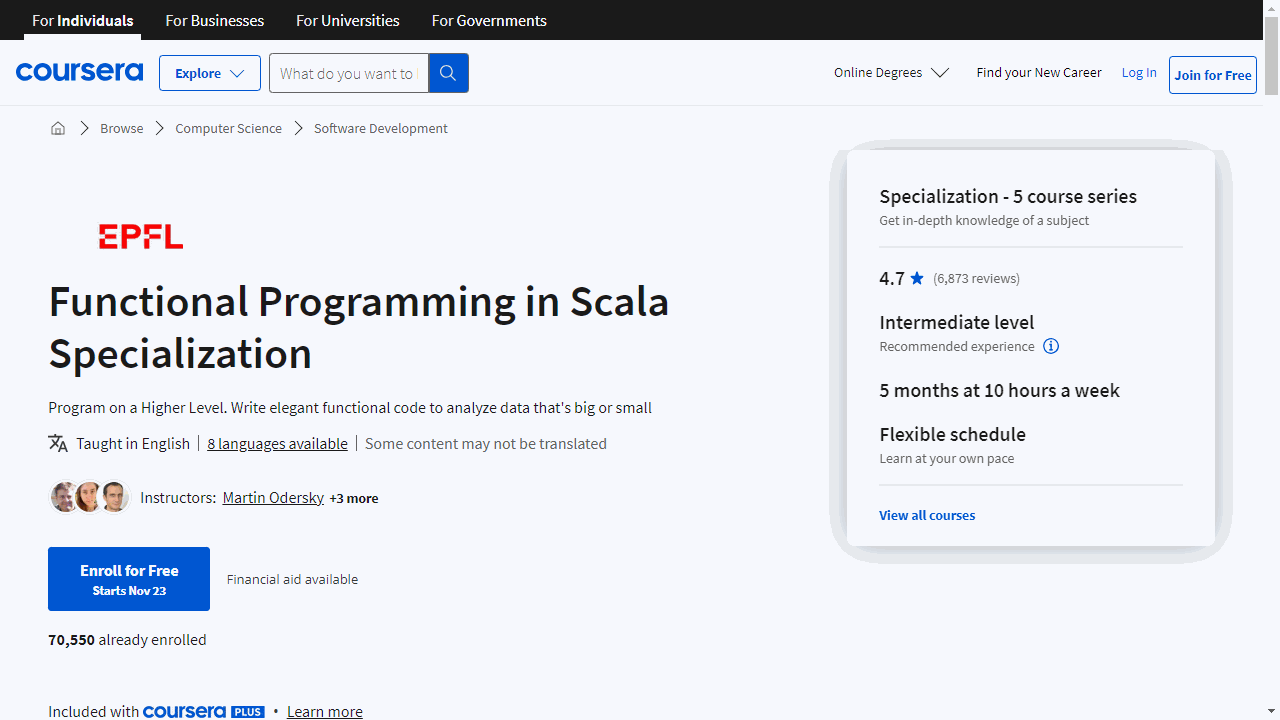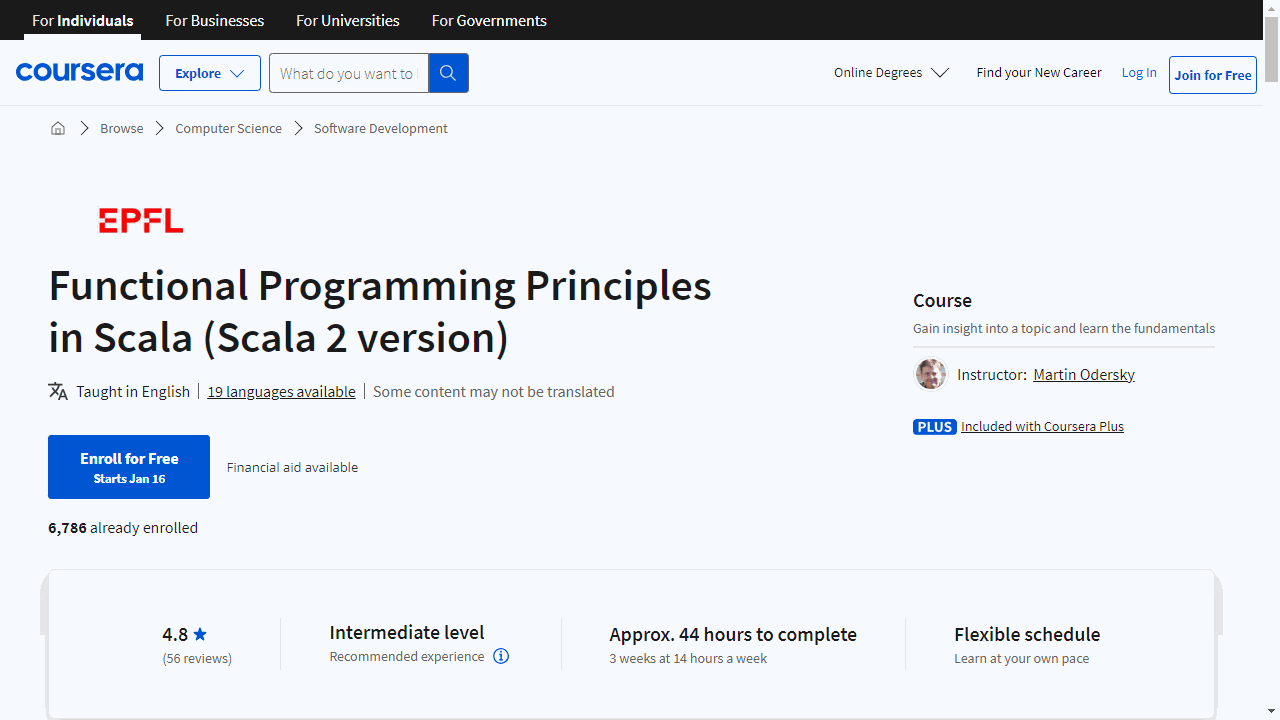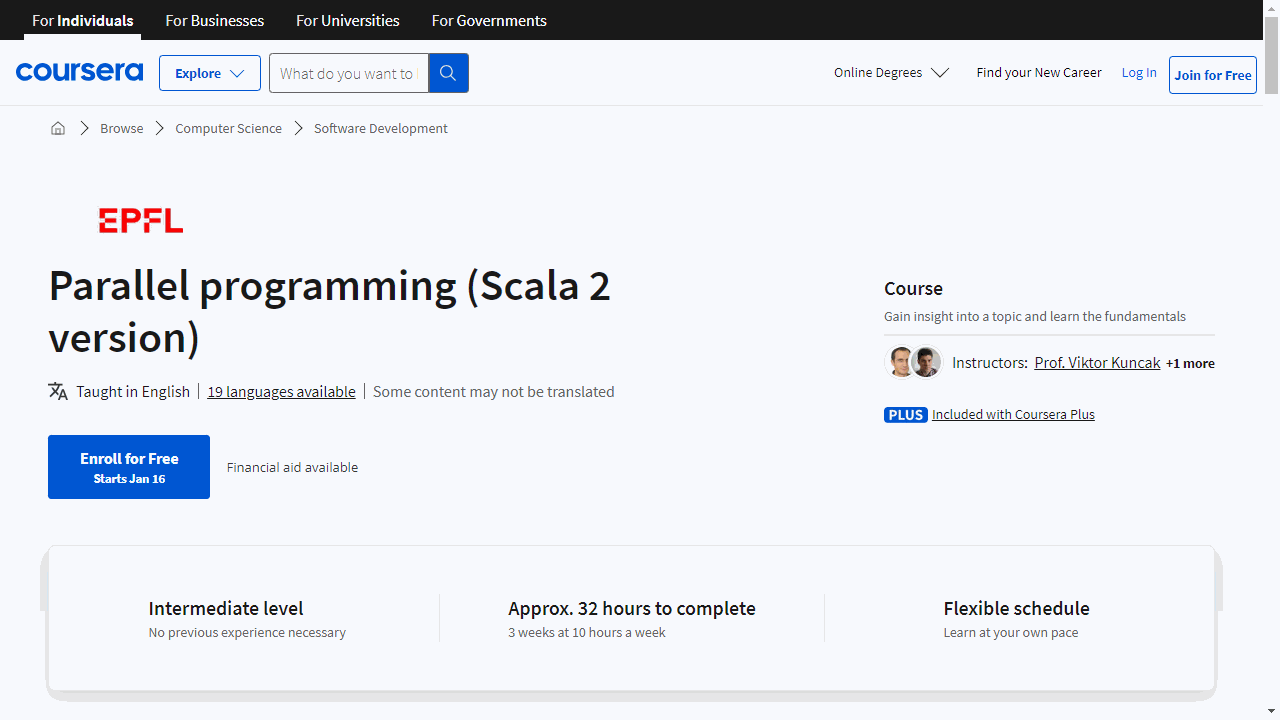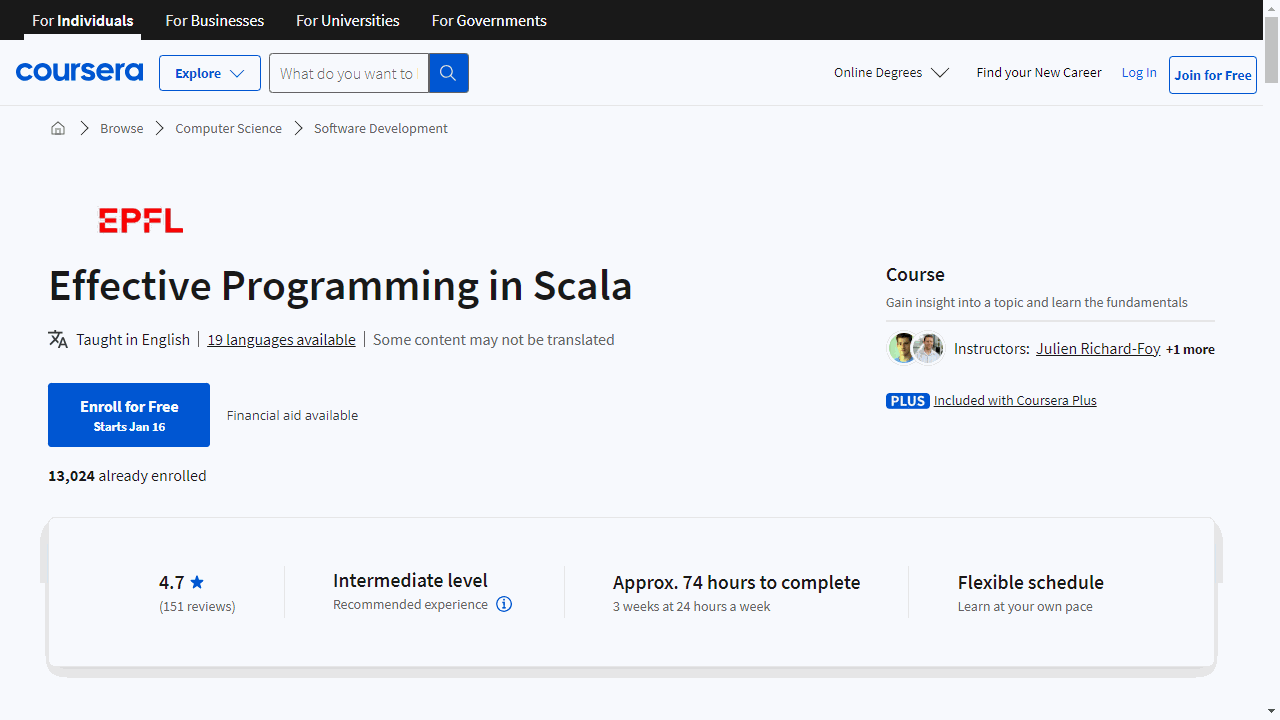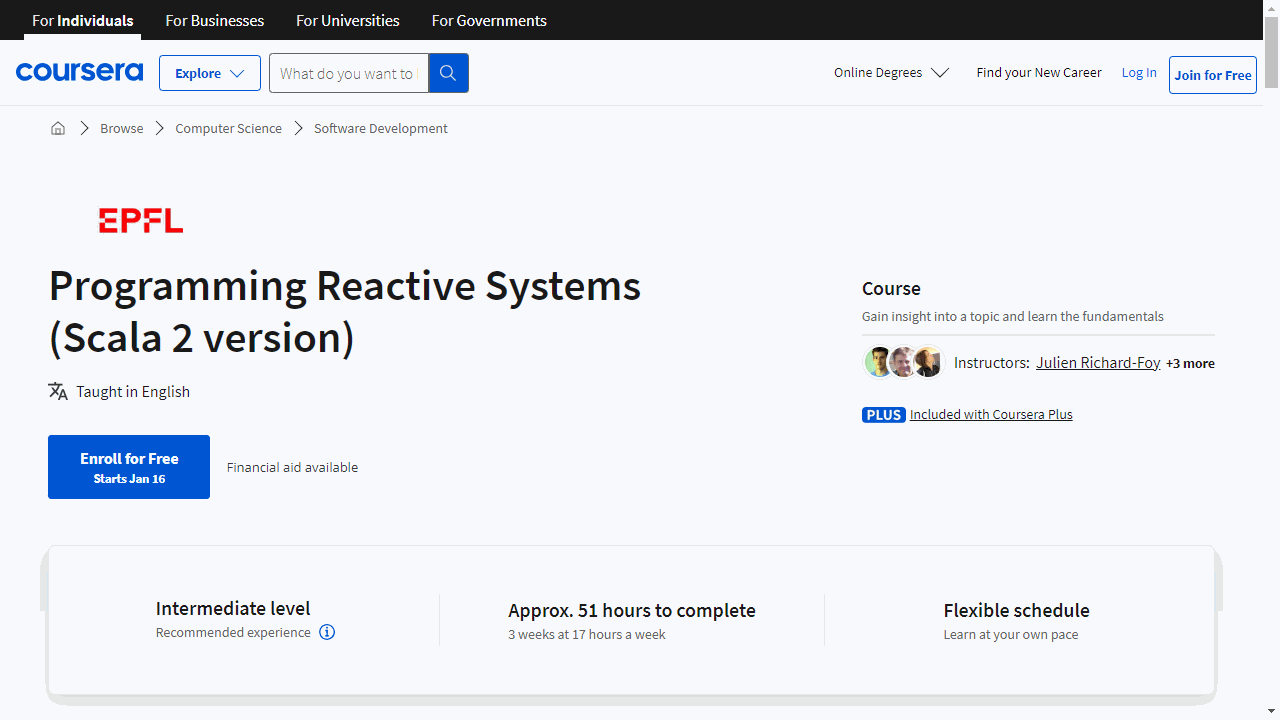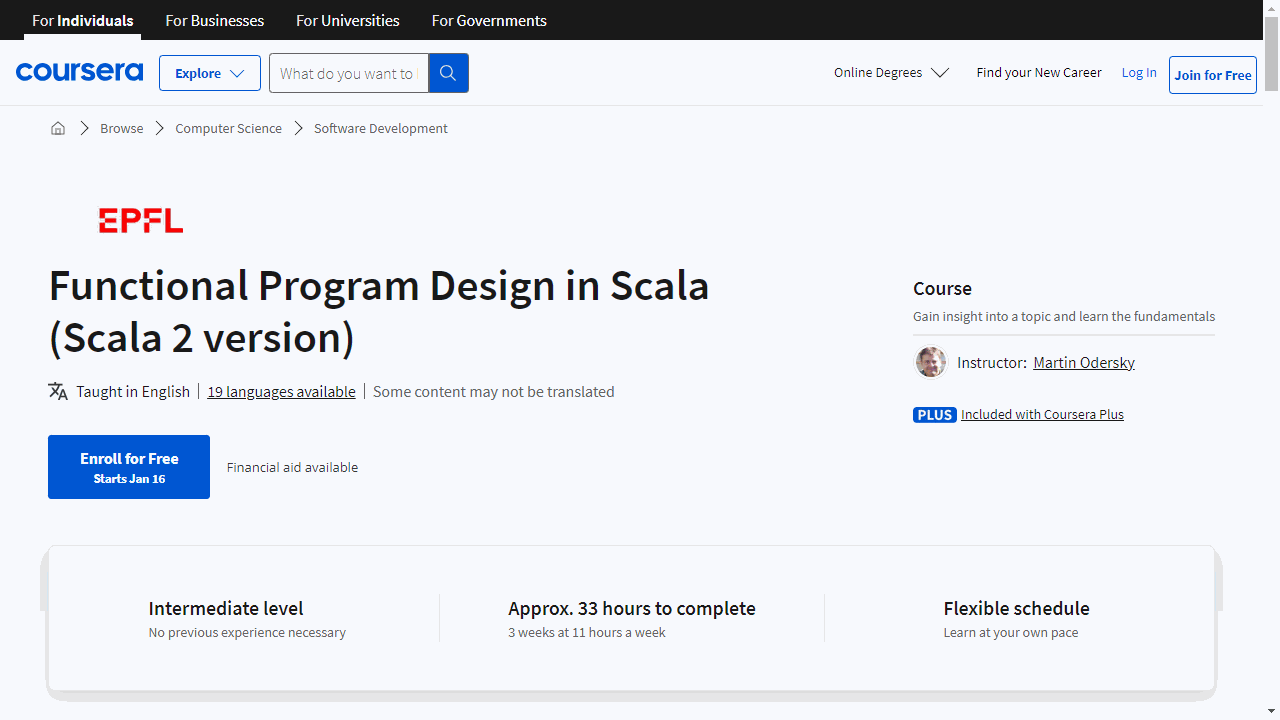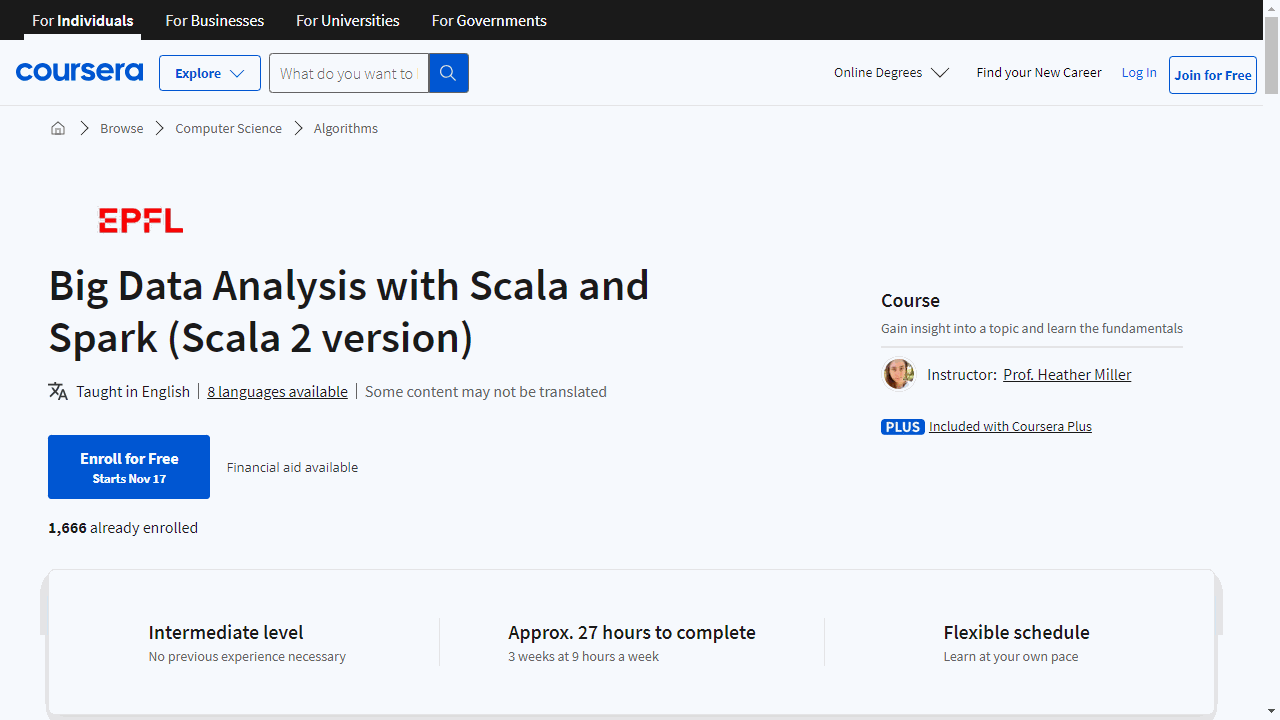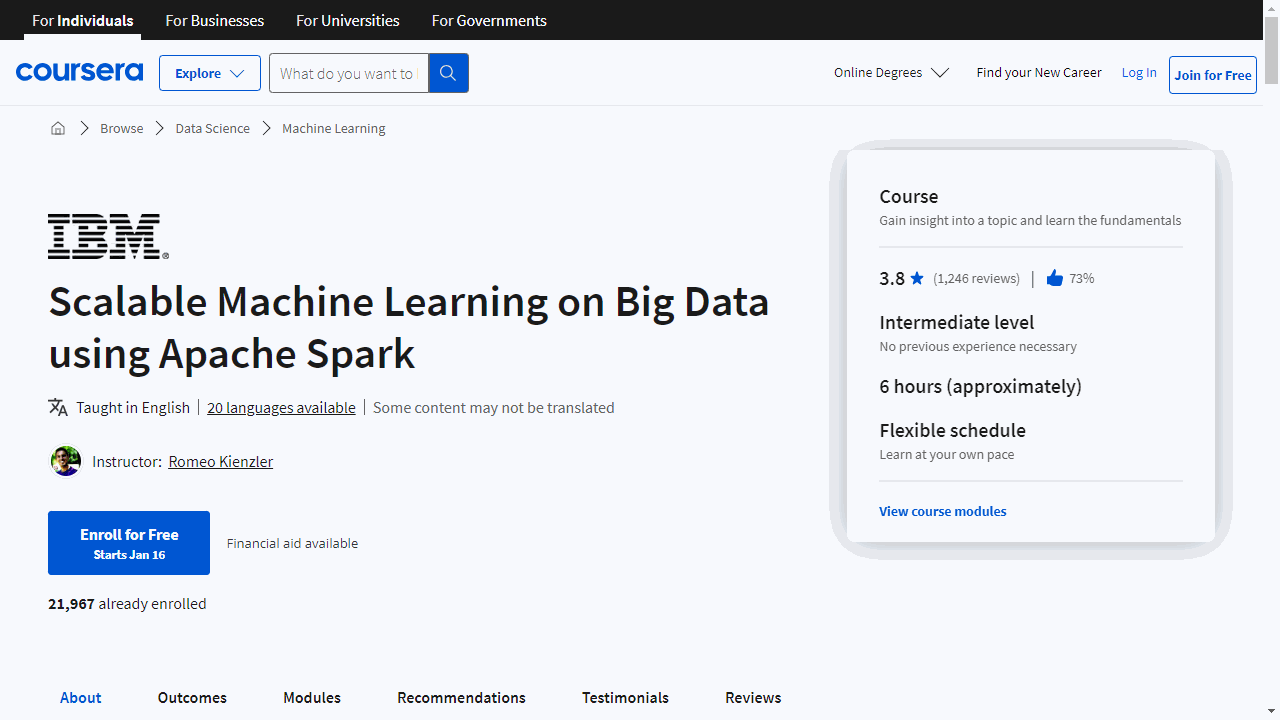Scala is a powerful and versatile programming language known for its combination of object-oriented and functional programming paradigms.
It’s widely used in big data, distributed systems, and web development, making it a valuable skill for software developers seeking to expand their capabilities.
Learning Scala allows you to write concise, efficient, and maintainable code, opening doors to exciting opportunities in the tech world.
Finding a high-quality Scala course on Coursera can be challenging, with so many options available.
You’re likely looking for a program that’s engaging, comprehensive, and taught by experts, but also aligns with your specific needs and learning style.
For the best overall Scala course on Coursera, we recommend the Functional Programming in Scala Specialization.
This specialization goes beyond the basics, covering everything from fundamental functional programming concepts to advanced techniques like lazy evaluation and monads.
One of the instructors, Martin Odersky, is the designer of Scala, ensuring you’re learning from the best.
It also includes modules on parallel programming and big data analysis with Spark, equipping you with the skills to tackle real-world challenges.
While Functional Programming in Scala Specialization is our top recommendation, we understand that everyone has different learning preferences and goals.
That’s why we’ve compiled a comprehensive list of other excellent Scala courses on Coursera, covering various aspects of the language, from introductory concepts to advanced topics.
Keep reading to explore these options and discover the perfect fit for your learning journey.
Functional Programming in Scala Specialization
If you’re scouring the web for top-notch Java programming courses and plan to work in data engineering, consider expanding your horizons with the “Functional Programming in Scala Specialization” on Coursera.
Scala is a robust language that complements Java, and it’s the driving force behind Spark.
Dive into “Functional Programming Principles in Scala” to grasp the essentials of Scala’s functional style.
You’ll tackle real-world programming challenges by mastering recursion, pattern matching, and higher-order functions, setting the foundation for immutable data structures and clean code.
Progress to “Functional Program Design in Scala,” where you’ll refine your skills by learning advanced concepts like lazy evaluation and monads.
This course emphasizes practical design and teaches you to craft functional libraries and APIs, preparing you for real-world Scala application development.
“Parallel programming” introduces you to the power of parallelism in modern computing.
You’ll learn to parallelize operations and leverage Scala’s parallel collections, optimizing code for performance and tackling data-intensive tasks efficiently.
In “Big Data Analysis with Scala and Spark,” you’ll harness the capabilities of Apache Spark for big data processing.
This course equips you with the skills to manage large datasets, perform functional data analysis, and optimize Spark operations for speed and efficiency.
The capstone project is where theory meets practice.
You’ll build a data-intensive application, processing gigabytes of data and creating interactive visualizations.
This hands-on experience solidifies your Scala and big data expertise, giving you a competitive edge.
Functional Programming Principles in Scala (Scala 2 version)
Provider: École Polytechnique Fédérale de Lausanne
This course is designed to give you a solid foundation in Scala, focusing on functional programming techniques that are essential for modern software development.
Right from the start, you’ll get hands-on with setting up your development environment, tailored to Linux, Mac OS X, or Windows.
This ensures you’re ready to code without any setup hassles.
The course begins by introducing you to programming paradigms and core programming concepts.
You’ll quickly move on to practical applications, like using Newton’s method for calculating square roots, which demonstrates the power of Scala in solving real-world problems.
You’ll delve into recursion, a critical concept in functional programming, which helps you write cleaner, more efficient code.
The course also covers higher-order functions and currying, empowering you to create more versatile and maintainable programs.
As you progress, you’ll explore class hierarchies and polymorphism, gaining an understanding of how Scala’s object-oriented features mesh with functional programming.
You’ll also learn about subtyping, generics, and pattern matching, which are key to writing robust Scala code.
One of the highlights is the hands-on project on Huffman coding, where you’ll apply your skills to data compression, a practical skill in software optimization.
The course doesn’t stop there.
You’ll master collections, combinatorial search, and for-expressions, rounding out your Scala expertise.
And to cap it off, you’ll tackle anagrams, a fun and challenging way to put your new knowledge to the test.
Throughout the course, you’ll have access to a Scala tutorial, style guide, and cheat sheet, as well as tutorials for IntelliJ IDEA and SBT—tools that streamline your Scala development process.
Parallel programming (Scala 2 version)
Provider: École Polytechnique Fédérale de Lausanne
Tailored for Scala 2, this course dives into the essentials of parallel computing on the JVM, a must-know for efficient Scala coding.
You’ll kick things off with an introduction to parallel computing concepts, setting a solid foundation for what’s to come.
Then, you’ll delve into the JVM’s parallel capabilities, learning how to execute computations simultaneously to boost your program’s performance.
Get ready to apply what you learn right away with practical exercises like using the Monte Carlo method to estimate Pi.
This isn’t just theory; it’s hands-on experience that translates to real-world applications.
As you progress, you’ll discover how to measure the speed of your parallel programs through benchmarking.
This skill is vital for optimizing your code’s performance.
You’ll also tackle creating a parallel box blur filter, an image processing technique that showcases your parallel programming prowess.
The course ensures you’re well-equipped with the necessary tools, guiding you through IntelliJ IDEA and sbt setup.
These are the tools of the trade for Scala developers, and you’ll learn how to use them effectively.
Dive deeper into parallel sorting, data operations, and mapping.
You’ll explore the parallel fold (reduce) operation and the importance of associativity in parallel programming—a key concept for writing efficient code.
Data-parallel programming is another highlight, where you’ll work with Scala parallel collections and master splitters and combiners.
These concepts are crucial for managing data in parallel environments.
You’ll also tackle real-world problems using the K-Means algorithm, a staple in machine learning for data clustering.
Plus, you’ll delve into the conc-tree data structure and learn how to implement combiners for efficient parallel construction.
The course culminates with the Barnes-Hut simulation, a technique used to simulate complex systems, reinforcing the practical application of your new skills.
Effective Programming in Scala
Provider: École Polytechnique Fédérale de Lausanne
This comprehensive course starts with the essentials, guiding you through program elements, types, and methods.
You’ll quickly learn to control your code with conditions and dive into domain modeling using case classes and traits.
You won’t just write code; you’ll understand it.
The course teaches you to set up essential tools like Scala 3 REPL and troubleshoot when things don’t go as planned.
You’ll become adept at managing lists and collections, crucial for organizing data in Scala, and you’ll master loops and recursion for efficient code that does the heavy lifting for you.
As you progress, you’ll discover how to structure your projects with sbt, Scala’s interactive build tool, and refine your classes for cleaner, more efficient code.
You’ll also learn to encapsulate your work to protect it from unwanted interference.
Testing is a focal point of this course.
You’ll learn to ensure your code’s reliability through unit testing, property-based testing, and integration testing.
Debugging skills are also covered, with tools like Quickcheck to help you identify and fix issues quickly.
The course doesn’t shy away from advanced topics.
You’ll explore type-directed programming, error handling, and concurrent programming, equipping you with the skills to write sophisticated, error-resistant, and multi-tasking applications.
Practical projects like Fireworks, Democracy, Todo List, Quickcheck, and Wikigraph allow you to apply your new skills in real-world scenarios, solidifying your learning and giving you tangible work to showcase.
Programming Reactive Systems (Scala 2 version)
Provider: École Polytechnique Fédérale de Lausanne
You’ll start by mastering the basics of Scala, including functions, pattern matching, and collections.
Then, you’ll move on to asynchronous programming and Futures, learning to handle operations that are essential for responsive applications.
The course is interactive, with assignments that challenge you to apply what you’ve learned.
If you opt for the verified track, you’ll tackle even more complex problems.
As you progress, you’ll delve into the Actor Model, discovering how to create systems that are both robust and easy to manage.
You’ll design, test, and troubleshoot actor systems, gaining insights into actor lifecycle and failure handling.
Distributed systems are next on the agenda, where you’ll explore how to build applications that run seamlessly across multiple machines.
You’ll learn about scalability and responsiveness, ensuring your systems can grow and remain efficient.
Stream processing is a key focus, with modules on Akka Streams and Reactive Streams Semantics.
You’ll manage data flows, handle variable processing rates, and learn strategies for failure recovery.
Protocols come into play as you learn to define clear communication rules within your programs.
You’ll work with Akka Typed to implement these protocols, test behaviors, and use Akka Typed Persistence to maintain stateful actors.
The course concludes with advanced topics like stream and actor integration and managing complex operations.
Your final project will be to create a reactive followers system, putting all your new skills to the test.
Supporting your learning journey, the course provides a wealth of resources, including cheat sheets, IntelliJ IDEA and SBT tutorials, and a Scala style guide to ensure your code is clean and professional.
Functional Program Design in Scala (Scala 2 version)
Provider: École Polytechnique Fédérale de Lausanne
You’ll begin with a refresher on functions, pattern matching, and collections to solidify your foundation.
Then, you’ll delve into the power of ‘for’ expressions and their translations, unlocking the secrets of functional random generators and the pivotal concept of monads.
Practical learning is at the heart of this course.
You’ll apply your knowledge through an example assignment and leverage Quickcheck for automated testing, ensuring your code is robust.
If you hit a snag, the troubleshooting guide is there to help.
The curriculum then guides you through advanced topics like structural induction on trees, the intricacies of streams, and the efficiency of lazy evaluation.
You’ll tackle the water pouring problem, enhancing your problem-solving skills.
As you progress, you’ll encounter Bloxorz and JSON codecs, diving into type-directed programming and type classes.
You’ll master implicit definitions and conversions, crucial for writing elegant Scala code.
The course intensifies with a focus on functions and state, exploring identity, change, and loops through the lens of discrete event simulation.
You’ll not only learn the theory but also see it in action with hands-on implementation and testing.
You’ll also get to grips with the Observer pattern and functional reactive programming (FRP), culminating in building your own calculator.
This project cements your understanding by applying all the concepts you’ve learned.
The course provides sbt and IntelliJ IDEA tutorials, Scala cheat sheets, and a clear grading policy.
You’ll have all the resources you need to succeed.
Big Data Analysis with Scala and Spark (Scala 2 version)
The course begins with an introduction that helps you understand the essentials of distributed data-parallel processing, which is crucial for handling large datasets across multiple computers.
One of the key concepts you’ll tackle is latency, learning its significance in data processing and how to minimize it effectively.
This isn’t just theoretical; you’ll see how these ideas play out in real-world scenarios.
RDDs are central to Spark, and you’ll become well-versed in managing these distributed collections.
You’ll discover how to perform transformations and actions on RDDs, which differ from standard Scala collections.
This distinction is important, as Spark has its unique evaluation strategies.
The course also emphasizes the importance of cluster topology, teaching you how the configuration of a computing cluster can impact your data processing tasks.
You’ll get to apply what you’ve learned through practical examples, including an exploration of Wikipedia data, which adds a layer of real-world relevance to your studies.
Tool setup and assignment submission are streamlined, thanks to a clear SBT tutorial included in the syllabus.
This ensures that you can focus more on learning and less on configuration.
As you progress, you’ll delve into more advanced topics such as reduction operations, pair RDDs, and the intricacies of shuffling and partitioning.
These concepts are critical for optimizing Spark’s performance and are explained in a way that’s accessible and applicable.
The course also covers the differences between wide and narrow dependencies, helping you understand their impact on Spark’s efficiency.
You’ll explore both structured and unstructured data, preparing you to handle various data types with ease.
With a focus on Spark SQL and DataFrames, the course introduces powerful tools for data querying and analysis.
You’ll appreciate the convenience these tools offer, making complex data tasks more manageable.
Datasets are also covered, providing you with a hybrid approach that combines the benefits of DataFrames with the type-safety of RDDs.
Finally, the course touches on time management within Spark, teaching you how to optimize your operations to save time and resources.
Scalable Machine Learning on Big Data using Apache Spark
Provider: IBM
You’ll start by understanding the essence of big data and the innovative ways to store and process it using Apache Spark’s parallel processing capabilities.
This knowledge is crucial as you’ll be dealing with vast datasets.
Scala’s functional programming is at the heart of this course.
You’ll learn this programming style, which is integral to writing clean, efficient code in Scala, the language of choice for Apache Spark.
The course takes you through Apache Spark’s fundamental concepts, including RDDs and DataFrames.
Through practical exercises, you’ll gain hands-on experience that will solidify your understanding of data manipulation within Spark.
Beyond coding, the course delves into data analysis.
You’ll learn to compute statistics like averages and standard deviation and use PCA for dimensionality reduction, which is essential for visualizing and understanding complex datasets.
Machine learning is a significant focus, with SparkML taking center stage.
You’ll explore data preparation, model building, and outcome prediction.
The course includes practical exercises on clustering with k-Means and tweaking machine learning pipelines, enhancing your problem-solving skills.
The sections on Linear and Logistic Regression will introduce you to predictive modeling and data classification.
Through exercises, you’ll not only learn these techniques but also how to refine your models for better performance.
The culmination of the course is a project that allows you to apply all the skills you’ve acquired.
This hands-on experience will enable you to create practical solutions using Scala and Spark.
